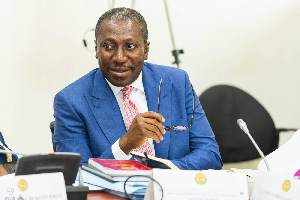...We Mustn't Be Complacent and Neglect Other Sectors
By J. Ato Kobbie, Managing Editor
The Executive Chairman of Antrak Group, and member of the Council of State, Alhaji Asoma Abu Banda, has cautioned Ghanaians against allowing the production of oil to become the beginning of their problems, rather than a blessing.
“I’m happy about the oil discovery but equally worried about what oil can do to our economy, if care was not taken,” Alhaji Banda told The Business Analyst in an exclusive interview, emphasizing: “It’s a blessing, but can turn into a curse if not properly handled.” According to the business magnate who has close to forty years’ experience in the transport industry spanning shipping, road and air transport, his fears were based on some of the experiences of Nigeria, where certain productive ventures collapsed with the onset of the oil industry. Elaborating further on the Nigerian predicament, Alhaji Banda said, “Nigeria used to be a serious exporter of groundnuts, and yet today they import the product to make their soup!” He said again, the southern part of Nigeria, which was also noted as one of the principal cocoa growing areas in the sub-region, lost its shine in that sector as everybody scrambled to become ‘oil merchants’. “The only way to avoid the Nigerian situation is to educate the people and create more employment channels,” he advocated, stressing that; “The masses must be educated so that in future we don’t end up importing cocoa for our chocolate factories!” He advised farmers not to sacrifice their current economic livelihood in pursuit of the ‘black gold’, in order not to fall prey as the Nigerians did. According to Alhaji Banda, expectations of the youth, especially those from the Western region, appear to be too high, as some are already claiming entitlement to more of the revenue because the oil was being produced in their area. He said this kind of expectation was unfortunate and potentially dangerous, considering that the oil is actually going to be produced from deep sea, with the nearest town, Half-Assini, over 60 kilometers away from where the wells are located.
His advice to the youth, who are interested in earning meaningful incomes from the production process is to acquire the relevant training in order to be well-positioned for employment by the many companies handling various aspects of the production process. Alhaji Banda wondered why government would sell its stake in telecommunications, which is the most lucrative business in the world today, and place its hopes on oil revenue. He cited the previous government’s sale of 70% of the state-owned Ghana Telecom to Vodafone and also the sale of 75% of erstwhile Western Telecommunications (Westel) to Zain Communications. “There is more money in telecommunications than in oil,” he stressed, referring to the growth and expansion of Spacefon to become a major component of the giant telecom network, MTN, as yet another example. The Western Region of Ghana is one of the major production sources of cocoa in the country, and also a major food basket and foreign exchange earner, where timber and lumber industries also abound. It is also a leading source of many natural resources such as gold and other minerals that are mined for export. There are fears that if care is not taken, important attention will eventually be diverted from the fact that the Western Region is also home to a major port city, Takoradi, whose activities and revenue may well come to surpass the number one, which is the Tema port, with the onset of the oil activities. The port is therefore another department where the government could invest in now to enhance and expand in order to accommodate the increased pressure that may stem from oil business nearby, to create more jobs to ‘soothe’ the expectation from the ‘black gold’. There have been concerns raised over the years directing at the fact that in spite of the documented significant official resource allocation to the Region based on its contribution to revenue flow into the country, it has very little to show in terms of development.
General News of Friday, 30 April 2010
Source: Business Analyst
Oil: Asoma Banda Warns Ghana
Entertainment











